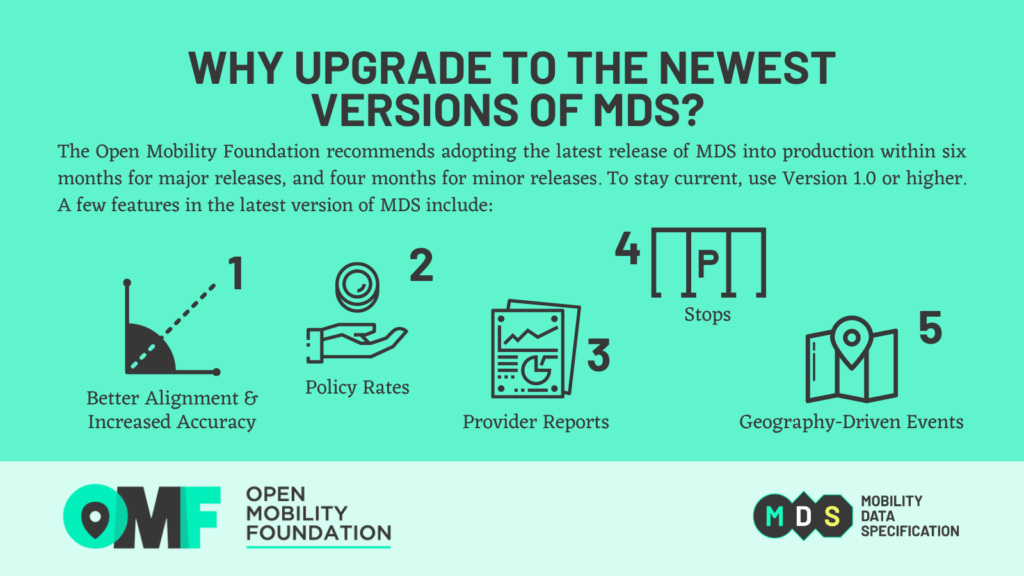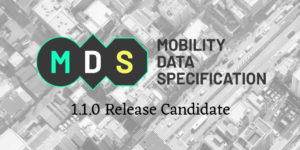Serving as the governing body for the Mobility Data Specification (MDS) doesn’t just mean building and maintaining it from a technical perspective – it also means keeping our community informed on how best to implement it. That includes things like providing guidance on which versions to use, sample policy language, and other information that promotes a well-functioning ecosystem.
BENEFITS OF UPGRADING
Upgrading to current and recommended versions of MDS has multiple benefits, including more accurate data, access to improved features and support, and a more effective data standard overall.
Recommended versions are supported and maintained by the Open Mobility Foundation (OMF) and our community – we provide updated guidance and documentation, track issues, and provide bug fixes and critical updates in the form of hotfixes for these versions. Additionally, the OMF’s network of members and contributors serve as a community of support for organizations using MDS, including those who need support implementing new versions.
We strongly recommend adopting the latest release of MDS into production within six months for major releases, and four months for minor releases. As of today, the most current version is 1.1. Version 1.0 is also considered a recommended version.

FEATURE FACING
Beyond the general benefits of staying current, new features mean MDS can handle extended use cases, provide more options for privacy and security, and users can access more consistent and easier-to-interpret data. Here’s some of the features that you can find in MDS 1.x:
Alignment of Provider and Agency
- Reconciles the historic naming differences between event terms within Provider and Agency, providing better accuracy
City Metrics
- Introduces a standard way to describe available metrics and serve as a mechanism for consistently aggregating data
- Helps all users of the specification communicate and share aggregated data using definitions and methodology for certain frequently used metrics (vehicle counts, trip duration, etc), reducing friction and miscommunications
Geography-Driven Events
- Provides an optional, alternative way to manage providers’ compliance (both real-time and historical) without precise location data
Policy Rates
- Improves MDS for use around fees and subsidies, allowing cities to enact complex policies to achieve their goals
Provider Reports
- Streamlines the process around existing aggregate reporting requirements for special groups, making it more efficient and consistent for providers
- Makes it easier for cities to understand how programs aimed at addressing price accessibility and other key policy objectives are being utilized
Public Endpoints
- Allows transparency for the public to see how a given city is regulating, holds the city accountable for their policy decisions, allows third parties to ingest this valuable information into their applications and services
- Reduces the technical burden on providers to use these endpoints
Stops
- Supports docked bikeshare and e-scooter programs, allowing cities to designate docks, parking areas, stations, and corrals across MDS
IN GOOD COMPANY
Through the recently conducted State of MDS Survey, we discovered that upgrades are already on the horizon for many cities and companies using MDS. This shift to align use around recommended versions will benefit cities and companies alike.
According to the survey, “of the 58% of agencies planning to upgrade in the next year, 100% of them are planning to upgrade to version 1.0. Of the software companies planning to upgrade in the next year, 83% of them are planning to upgrade to version 1.0. The latest major version – 1.0 – is supported or planned to be supported by 88% of mobility service providers and 100% of software companies as well.”
ADDITIONAL SUPPORT
The OMF maintains several additional resources to support MDS users, including:
- Documentation explaining version differences and upgrade benefits
- Sample language to communicate version requirements to providers
- Referenceable upgrade schedule recommended by the OMF




